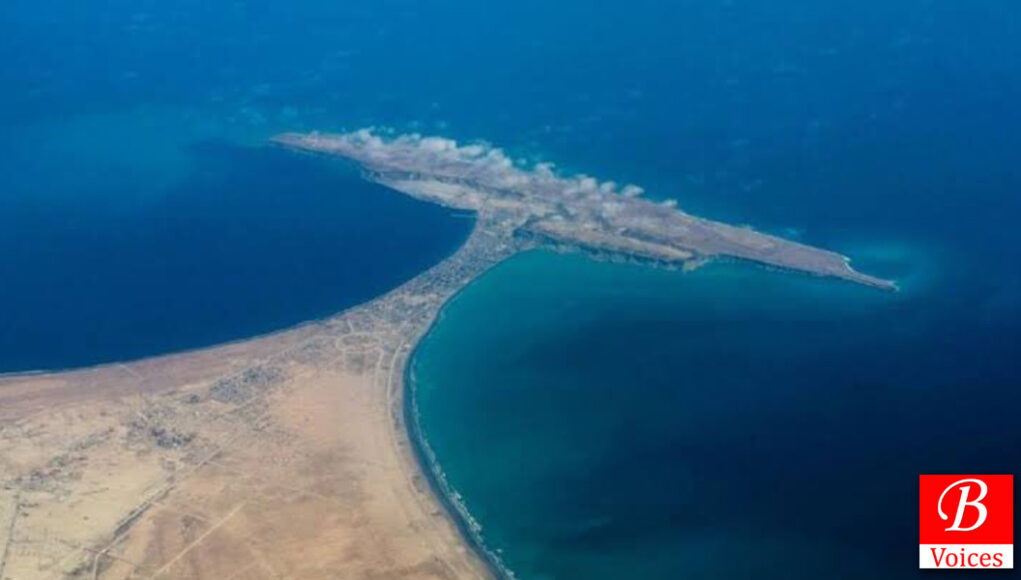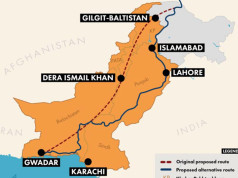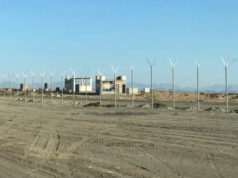Adnan Aamir
A major terrorist attack took place in port city Gwadar last Friday, in which a suicide bomber detonated near a convoy of Chinese personnel working on the A convoy carrying Chinese personnel working on the Eastbay Expressway.
According to reports, a young man who appeared to be in his early 20s was seen running towards the convoy as it was heading towards a fishermen’s settlement. Security personnel in plainclothes attempted to stop the person but he detonated the bomb 20 meters away from the convoy, killing three children who were playing nearby. One Chinese worker sustained minor injuries.
Baloch separatist group BLA claimed responsibility for the attack. In a statement claiming the attack, they mentioned the name of the suicide bomber and also issued his picture. BLA also claimed that nine Chinese personnel were killed in the attack. The deputy commissioner (DC) of Gwadar, however, denied this claim and clarified that only one Chinese worker sustained minor injuries.
Security officials believe that the BLA failed to carry out this attack as they had planned. “They wanted to cause mass casualties but the attack did not go as planned. That is why the BLA is exaggerating the number of casualties,” said one security official on condition of anonymity.
Despite the BLA’s failure, a suicide bombing in Gwadar is sending all the wrong signals about the port town, which is being marketed as ‘Singapore of the future by the government.
The incident has strengthened the perception that China-Pakistan Economic Corridor (CPEC) is under attack in Pakistan. This was the second major attack on Chinese personnel in one month, raising the concerns of the Chinese officials. Recently, the Chinese ambassador met Interior Minister Sheikh Rasheed and asked him to ensure a stronger security protocol for Chinese nationals. Political commentators termed this the Chinese version of “Do More” from Pakistan.
The Chinese are concerned because this was not the first attack on them in Gwadar. Since work on Gwadar port was launched in 2002, there have been at least three major attacks on Chinese projects before the last week’s suicide bombing. In May 2004, a vehicle carrying Chinese personnel was targeted with a car bombing. This resulted in the death of three Chinese engineers. This was the first attack against the Chinese in Balochistan and also a major one by Baloch insurgents. The second attack took place in May 2017, when 10 laborers working on a CPEC project were gunned down by Baloch separatists. Although none of the slain laborers were Chinese, they were targeted because they had been working on Chinese-sponsored projects.
The third attack took place in May 2019, when Baloch separatists stormed Pearl Continental hotel in Gwadar. Five people were killed in the attack; most of them were hotel employees. Pearl Continental hotel is the place where most foreign and national investors prefer to stay during their visits, and so the hotel was chosen to terrorize and discourage investors from coming to Gwadar. In 2019, security was beefed up immensely and that is why last week’s attack in Gwadar was a surprise for everyone.
Last year, the government approved a master plan for Gwadar. As per the plan, Gwadar would be made a weapon-free city with state-of-the-art security. In order to implement this plan, the government started fencing the city with barbed wire in December 2020. These barbed wire fences would have separated families and communities living in Gwadar and was therefore met with severe criticism from the public. The government shelved the plan to fence Gwadar and decided to protect it without putting wires around the city.
The government needs an inclusive security framework in Gwadar. This framework should take into account concerns and sensitives of the local population and should not alienate them. Fencing Gwadar city alienated the people and they reacted against it. Therefore, any plan to protect Gwadar must not create problems for locals. In any case, a city covered by barbed wire fences does not give a reassuring message to foreign investors who are looking to invest here.
Gwadar can never be fully functional and a successful regional commercial hub until it is fully secure. In order to achieve long-term peace and stability in Gwadar, the wider Baloch conflict linked with insurgency needs to be resolved. If Baloch insurgents keep carrying out terrorist attacks over the years, it will be enough to keep foreign investors at bay. Therefore, the decision by Prime Minister Imran Khan to start negotiations with Baloch separatists is an encouraging move in this regard.
Lastly, in the entire debate surrounding the Gwadar blast and the future security of the city, people often miss the real victims – the people of Gwadar. The three innocent children killed in Friday’s blast were victims of a conflict in which they had no role. In the future, every effort to protect Gwadar must be people-centric because without gaining the support of locals, the Gwadar project can never achieve its potential.
Share your comments!








